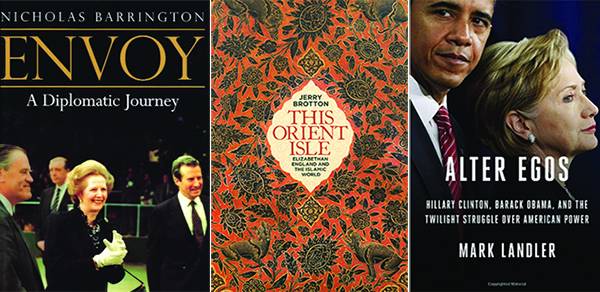
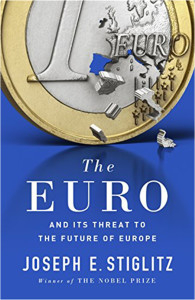
The Euro and its Threat to the Future of Europe
Joseph E. Stiglitz
Allen Lane (hardcover), 2016
PRs 1,695
Solidarity and prosperity fostered by economic integration: this principle has underpinned the European project from the start, and the establishment of a common currency was supposed to be its most audacious and tangible achievement. Since 2008, however, the European Union has ricocheted between stagnation and crisis. The inability of the eurozone to match the recovery in the USA and UK has exposed its governing structures, institutions and policies as dysfunctional and called into question the viability of a common currency shared by such different economies as Germany and Greece.
Designed to bring the European Union closer together, the euro has actually done the opposite: after nearly a decade without growth, unity has been replaced with dissent and enlargements with prospective exits. Joseph Stiglitz argues that Europe’s stagnation and bleak outlook are a direct result of the fundamental flaws inherent in the euro project - economic integration outpacing political integration with a structure that promotes divergence rather than convergence. Money relentlessly leaves the weaker member states and goes to the strong, with debt accumulating in a few ill-favoured countries. The question then is: Can the euro be saved?
Laying bare the European Central Bank’s misguided inflation-only mandate and explaining why austerity has condemned Europe to unending stagnation, Stiglitz outlines the fundamental reforms necessary to the structure of the eurozone and the policies imposed on the member countries suffering the most. But the same lack of sufficient political solidarity that led to the creation of a flawed euro twenty years ago suggests that these reforms are unlikely to be adopted. Hoping to avoid the huge costs associated with current policies, Stiglitz proposes two other alternatives: a well-managed end to the common currency; or a bold, new system dubbed ‘the flexible euro.’ This important book, by one of the world’s leading economists, addresses the euro-crisis on a bigger intellectual scale than any predecessor.
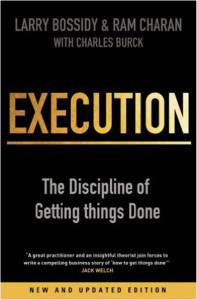
Execution: The Discipline of Getting Things Done
Larry Bossidy and Ram Charan with Charles Burck
Business Books (paperback), 2009
PRs 1,795
The book that shows how to get the job done and deliver results . . . whether you’re running an entire company or in your first management job.
Larry Bossidy is one of the world’s most acclaimed CEOs, a man with few peers who has a track record for delivering results. Ram Charan is a legendary advisor to senior executives and boards of directors, a man with unparalleled insight into why some companies are successful and others are not. Together they’ve pooled their knowledge and experience into the one book on how to close the gap between results promised and results delivered that people in business need today.
After a long, stellar career with General Electric, Larry Bossidy transformed AlliedSignal into one of the world’s most admired companies and was named CEO of the year in 1998 by Chief Executive magazine. Accomplishments such as 31 consecutive quarters of earnings-per-share growth of 13 percent or more didn’t just happen; they resulted from the consistent practice of the discipline of execution: understanding how to link together people, strategy, and operations, the three core processes of every business.
Leading these processes is the real job of running a business, not formulating a “vision” and leaving the work of carrying it out to others. Bossidy and Charan show the importance of being deeply and passionately engaged in an organization and why robust dialogues about people, strategy, and operations result in a business based on intellectual honesty and realism.
Putting an execution culture in place is hard, but losing it is easy. In July 2001 Larry Bossidy was asked by the board of directors of Honeywell International (it had merged with AlliedSignal) to return and get the company back on track. He’s been putting the ideas he writes about in Execution to work in real time.
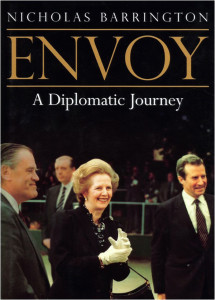
Envoy
Nicholas Barrington
The Radcliffe Press (hardcover), 2014
PRs 3,995
Nicholas Barrington began his dramatic diplomatic career with a post in Afghanistan at a time the country was barely known to the world’s headline writers. The narrative of his 37 year career in the British Foreign Office is woven with compelling insights on the countries to which he was posted and which are focal points of international attention: Afghanistan, Iran, Egypt and Pakistan. Serving in Iran during the political storm of the Islamic Revolution in 1979, he had to navigate his way through the drama of a new political order, while his time in Cairo coincided with the assassination of President Sadat. In his rich and varied career, Barrington served as High Commissioner to Pakistan, a subject on which he writes authoritatively. Exploring the complex power relations between Benazir Bhutto and Nawaz Sharif and examining the multifaceted conflicts in Kashmir and Afghanistan, this book sheds an invaluable new light on the interaction between Islam, the West and British Foreign Policy in the 20th Century. With erudition and wit, these unique memoirs will prove essential reading for those seeking to understand the political tensions and international issues of the post-war world.
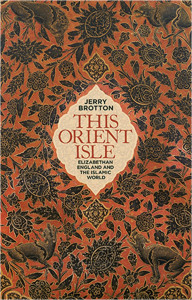
This Orient Isle: Elizabethan England and the Islamic World
Jerry Brotton
Allen Lane (hardcover), 2016
PRs 2,195
In 1570, when it became clear she would never be gathered into the Catholic fold, Elizabeth I was excommunicated by the Pope. On the principle that ‘my enemy’s enemy is my friend’, this marked the beginning of an extraordinary English alignment with the Muslim powers who were fighting Catholic Spain in the Mediterranean, and of cultural, economic and political exchanges with the Islamic world of a depth not again experienced until the modern age. England signed treaties with the Ottoman Porte, received ambassadors from the kings of Morocco and shipped munitions to Marrakesh. By the late 1580s hundreds, perhaps thousands, of Elizabethan merchants, diplomats, sailors, artisans and privateers were plying their trade from Morocco to Persia. These included the resourceful mercer Anthony Jenkinson who met both Süleyman the Magnificent and the Persian Shah Tahmasp in the 1560s, William Harborne, the Norfolk merchant who became the first English ambassador to the Ottoman court in 1582 and the adventurer Sir Anthony Sherley, who spent much of 1600 at the court of Shah Abbas the Great. The previous year, remarkably, Elizabeth sent the Lancastrian blacksmith Thomas Dallam to the Ottoman capital to play his clockwork organ in front of Sultan Mehmed. The awareness of Islam which these Englishmen brought home found its way into many of the great cultural productions of the day, including most famously Marlowe’s Tamburlaine, and Shakespeare’s Titus Andronicus and The Merchant of Venice. The year after Dallam’s expedition the Moroccan ambassador, Abd al-Wahid bin Mohammed al-Annuri, spent six months in London with his entourage. Shakespeare wrote Othello six months later. This Orient Isle shows that England’s relations with the Muslim world were far more extensive, and often more amicable, than we have appreciated, and that their influence was felt across the political, commercial and domestic landscape of Elizabethan England. It is a startlingly unfamiliar picture of part of our national and international history.
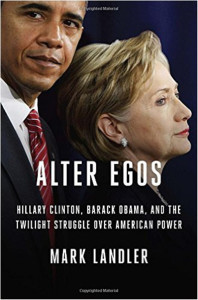
Alter Egos: Hillary Clinton, Barack Obama, and the Twilight Struggle Over American Power
Mark Landler
WH Allen (paperback), 2016
PRs 1,695
The deeply reported story of two supremely ambitious figures, Barack Obama and Hillary Clinton—archrivals who became partners for a time, trailblazers who share a common sense of their historic destiny but hold very different beliefs about how to project American power
In Alter Egos, veteran New York Times White House correspondent Mark Landler takes us inside the fraught and fascinating relationship between Barack Obama and Hillary Clinton—a relationship that has framed the nation’s great debates over war and peace for the past eight years.
In the annals of American statecraft, theirs was a most unlikely alliance. Clinton, daughter of an anticommunist father, was raised in the Republican suburbs of Chicago in the aftermath of World War II, nourishing an unshakable belief in the United States as a force for good in distant lands. Obama, an itinerant child of the 1970s, was raised by a single mother in Indonesia and Hawaii, suspended between worlds and a witness to the less savory side of Uncle Sam’s influence abroad. Clinton and Obama would later come to embody competing visions of America’s role in the world: his, restrained, inward-looking, painfully aware of limits; hers, hard-edged, pragmatic, unabashedly old-fashioned.
With the grand sweep of history and the pointillist detail of an account based on insider access—the book draws on exclusive interviews with more than one hundred senior administration officials, foreign diplomats, and friends of Obama and Clinton—Mark Landler offers the definitive account of a complex, profoundly important relationship. As Barack Obama prepares to relinquish the presidency, and Hillary Clinton makes perhaps her last bid for it, how both regard American power is a central question of our time.

